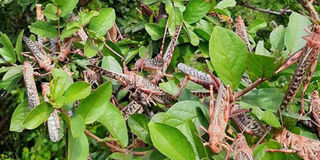Locust invasion: Another swarm in Wajir despite spraying

Desert locusts are pictured in Gurar, Wajir North, on January 16, 2020. PHOTO | BRUHAN MAKONG | NATION MEDIA GROUP
What you need to know:
- Wajir, Mandera and Garissa counties were first hit by the invasion and were followed by Marsabit, Isiolo, Meru, Samburu and Laikipia counties.
- Mr Hassan Gure, an official from Wajir's agriculture department, said the locusts migrated into the area two days ago.
- Wajir's Agriculture executive, Mr Ahmed Shariff, said at least 15 swarms have spread into the county so far from Somalia and Ethiopia.
- Mr Shariff appealed to the government to declare the invasion a national disaster and intensify aerial spraying as it is the most effective method.
An army of desert locusts has invaded Wajir South sub-county despite the ongoing aerial spraying.
Wajir, Mandera and Garissa counties were first hit by the invasion and were followed by Marsabit, Isiolo, Meru, Samburu and Laikipia counties
In Wajir, the locusts were first sighted in Kutulo, Tarbaj sub-county, more than two weeks ago, having flown from Somalia.
The army then flew to Wajir West, Wajir North, Eldas and Wajir South, destroying swathes of vegetation and pasture in a region where pastoralism is the main source of livelihood.
THE SPREAD
In an interview with the Nation, Mr Hassan Gure, an official from the county agriculture department, said the locusts migrated into the area two days ago.
Reports from the department said that two swarms were on their way to Somalia and two others to Mandera County.
"We are told they passed Elwak town at around 4.45pm and moved to the Wajir side towards Shimbir Fatuma," said Mr Gure.
Regarding spraying on Friday morning, Mr Gure said the exercise was ineffective since the plan was restricted to certain areas due to the threat of Al-Shabaab militants.
NATIONAL DISASTER
Wajir's Agriculture executive, Mr Ahmed Shariff, said at least 15 swarms have spread into the county so far from Somalia and Ethiopia.
Seven were repelled by the spraying, he said, while eight were pushed away by the combined efforts of residents and parties including security officers.
Mr Shariff appealed to the government to declare the invasion a national disaster and intensify aerial spraying as it is the most effective method.
He said the government should dispatch more chemicals to the northern region to prevent another invasion.
"We have all seen the effects of the invasion. The government should declare it a national disaster to pave way for more resources to be mobilised," he said.
CHALLENGES
On Thursday, Agriculture Cabinet Secretary(CS) Peter Munya said the pesticides they had been using were ineffective but that the government had bought 6,000 litres of a more effective chemical.
Regarding challenges in fighting the locusts, Mr Shariff said the expansive size of land made it difficult to single out entry points.
He also cited misinformation among members of the public.



